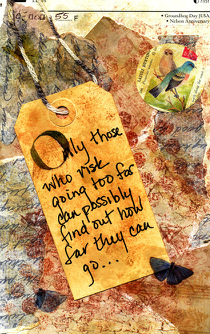| So, last time I mentioned that there was a way to bring the characteristics and qualities of your favorite fictional characters into your real life. Today, I'll discuss how you do that. This is the fun part! The first thing we need to do is know who we're working with. A note of caution: Please don't use this exercise to sort through trauma memories, unless you have the support of a therapist or someone you trust completely! This exercise is not meant for processing PTSD or other trauma. Let's start by picking out the fictional character that you most admire and that you feel like you most relate to. If you can't decide on one, pick a second, but don't pick more than two - it will get difficult to analyze more than two characters at a time. If you want to go back and do this exercise later with another character, you can do that but it's really best to stick to one at a time if you can. Next, spend some time thinking about the character. What do you like best about this character, in terms of their identity or personality? Keep these qualities in mind as you answer the following questions. I've attached a handy worksheet for you if you prefer to work that way. |
|
0 Comments
So, interestingly enough, I fell off the wagon in regard to blogging. It’s ironic that just as I was talking about goals and achieving them, I did not achieve mine! This is a great opportunity, though, to emphasize the action planning and commitment needed. How DO we create an action plan that is realistic and achievable? After you’ve identified and come up with strategies (your “coulds”), your next step is categorize them. I recommend keeping it simple, so I use three basic piles:
I thought for a while about whether or not I wanted to write about this, because there are so many armchair psychologists who are ready to explain and point fingers in regard to Robin Williams' suicide. Today, however, after hearing some of my clients' reactions and after hearing some of the things said in the media about it, I feel that I have something to say that might be helpful.
Mr. Williams' struggles with depression and addiction are well-known, and it's very easy to point fingers and say, "that was what did it." I've heard variations on that theme all day, most of them said with the attitude that nothing could help it. One radio host even went as far as to say, "He was beyond help. He was too far gone." I nearly had to pull my car off the road after hearing that, because I was so angry. I work all day with people who struggle with those feelings and with the pain and hopelessness that goes along with them. To hear a DJ blithely blame the victim was nearly too much for me. NO ONE IS "BEYOND HELP;" AND NO ONE IS "TOO FAR GONE." I can't emphasize that enough. In my work, one of the hardest things I face is letting a client know that it’s time move on. There are many reasons for ending therapy, and I’m going to explain some of them so you can see how complex the decision can be. I’ll start with a couple of reasons why clients end therapy.
If you go into a bookstore, or on a e-commerce site that sells books, you'll notice that the self-help section is huge. Really HUGE. It seems like we want to improve so many areas of our lives - our size and appearance, our love life, our business and work lives, our mental health, and so many others. There are self-improvement programs you can buy online, and the books are full of ideas that you can use and apply to help improve your life. However, when we buy these programs or try these techniques, many times they don't seem to work - why is that?
There are a few reasons that might explain this. One factor is that our time and energy is limited. We get caught up in work and work issues, daily hassles like cooking and paying bills, family responsibilities... If you think about it, you'll find there are many, many reasons that we don't accomplish all the self-help and self-enhancement programs we purchase. All of these activities take time, and they take energy. When we do have a few minutes for leisure, many times we want to do something else. It's understandable - if something feels like too much work, we tend to avoid doing it. Another factor might be lack of support. We know that when people have support, they're more likely to make changes and they're more likely to stick to them. Beginning an exercise program is a great example: You're way more likely to keep moving and exercising when you have someone there with you. They support you, and to some extent, keep you accountable. Your coach is there to mentor you and to cheer you along as you creat the life you want to have. Accountability is the third factor I want to mention. I'm not thinking about accountability in a pressurized "have to" sense. Rather, I am suggesting that having another person to work with who knows your goals, your struggles, and your strengths can be an amazing support for you as you work to reach those goals and change your life! I love the word "coach" - it has such a positive connotation. Coaches share their knowledge with you, support you as you challenge yourself to reach goals (and challenge you themselves by nudging you toward your goals), and celebrate progress and life changes as they happen. It's a life-affirming, positive, and healthy profession.  In my attempt to turn the mood around here a bit, I thought I'd write about one of my favorite wellness tools: Journaling. I have to start by saying that my definition of what makes a "journal" is pretty broad - for years I kept a copy paper box full of file folders with inspiring articles, pictures, quotes - and my comments on them. That, for a while, was my "journal." My bottom line in terms what constitutes a "journal" is that it's anything you want it to be. If you call it a "journal," then in my book, it's a journal. Period. There are way too many things in our lives and our worlds that end up being judged - the last thing we need judged is our creative and psychological expressions. Make it whatever you want it to be! Today, my journals tend to be a little more traditional, but that doesn't mean that I don't branch out on occasion. I usued to keep a "creative journal" which used to be a page-a-day appointment book - I used the pages as something on which to mount my creative expressions. I've been feeling "blocked" creatively for the last couple of months, so there hasn't been anything new to add, but I'm hoping that I'll let loose with a barrage of visual creativity here soon. I also keep a "regular" journal in one of those cheap composition books that you can buy in the grocery store. This is really my therapeutic journal. When I have trouble thinking straight or am feeling overwhelmed, this is the spot where it all comes out. For me, my creative journal is my "public" journal - if anyone sees it, it's not that big of a deal (after all, I posted pictures of it - how picky can I be?). My "regular" journal is a different story, though. This is the private stuff. When I'm really having a tough time coping, I get this out and write until I can't write anymore. If you're going to do this kind of writing, make sure you feel safe, or that you have some safety to do it. You may want or need to hide, lock up, or keep your journal in a place you feel is safe. I'm not kidding about that either - once I was so overwhelmed and feeling so down that I wrote for nine straight pages! I've found that there are some incredible books and systems for journaling - my advice would be to do what works for you. That's an important point, because there's a perception that there are a lot of rules to follow, like you should write every day, or write for a certain amount of time or a certain number of pages. It's really important to do what works for YOU. Forget the rules, and forget the shoulds. Let yourself play, too - this can be fun as well as insightful! I don't put any pressure on myself to write every day, or to write about a certain topic - my journal is MY expression. If you're the kind of person who thinks journaling would help you, I would encourage you to do this - again, do what works for you. Some people have spent lots of money and taken lots of courses on certain systems, like the Progoff system. Others, myself included, buy tons of books on writing and journaling. Other people simply just do it. Some people keep one journal and work through one book at a time. Other people have three or four going at once. The point here is that this is a tool to help you cope, to help you feel better, and to help you deal with the world around you in a healthy way. It's a tool to help you get to know yourself, and to have a safe place to vent, let off steam, ponder deep thoughts, record your history - whatever you want to make it. This is not the only tool, by far - but it is a very helpful one. The hard thing is that I see so many people start this, and then quit because they think they are "not doing it right" or read something that makes them feel they are "not good enough." Frankly, as a journal-ist AND as a mental health professional, I can honestly tell you that there IS no one, right or true way to do this. Anything you do here IS good enough, because it's an expression of who you are, where you are in your life, and what you're dealing with. And if it helps you cope and feel better - as well as be a better person, than it is good enough, right enough, and healthy. If it appeals to you, look up journal prompts, or join a site with an ongoing journal support group. One of my projects that I have going is writing an e-book of journal prompts. I'm excited about it, and hope to offer it in time for the new year. Whatever you do, do what works. It's effective, and it's healthy. Please Note: The content on this blog is intended for informational purposes only. This is not therapy, and if you wish to work in therapy, please contact your local mental health agency or your physician for a referral. If you are in crisis or danger, please call 911 for immediate help. Please, again, realize that seeking out help really IS a sign of strength and not a sign of weakness. You don’t have to be alone in facing these things – there are people who care and who will help. Email me at: [email protected] Emotions are weird. They have a way of changing so fast we hardly know what hit us, and they can change our outlook on a situation, person or perception nearly as quickly. It helps to remember that as much as our emotions affect us, they do not define us. We are more than our emotions.
A few months ago, I struggled with this. I was feeling down - I was being impatient and it seemed like nothing was going right. Now, if you've been reading these blogs, you know as well as I do, that this is not the case. Red Flag #1 - feeling down about things does NOT mean that the feeling is reality. Ok, good enough - and I was still feeling lousy. So, I thought...if I were the client, what would I be doing in therapy? (Yeah, I know... I'm a therapy geek.) Most likely, I'd be looking at the situation and testing out whether my emotions were really reflecting reality, or whether they were masking reality. How do you do this? Marsha Linehan has a really cool tool that she uses in DBT called "chain analysis." You start with the event, behavior or situation that was the problem. In my case, I looked back to when I started feeling down, and the even had nothing to do with what seemed to be the situation. I was feeling lonely on the afternoon before, because I couldn't reach my family members to talk. That spiraled into feeling somewhat depressed. Specifically, I remember thinking, "I guess no one wants to talk to me. I might as well not exist." Red Flag #2: I was getting caught up in "Stinkin' Thinking." In doing a chain analysis, you identify the event/situation that started the problem, describe the event, including what you were feeling and/or thinking at the time or what you did as a result of what you felt, and then describe how intensely you behaved, thought, or felt. In my case, the loneliness, sense of failure and depression were pretty strong. I ended up thinking, "I"m never going to be able to do this. I might as well just quit." Red Flag #3 - Stinkin' Thinking again. The idea here is that you want to describe all this in as much detail as you possibly can. Here's a good litmus test: Could someone recreate *exactly* what you went through? If so, then you've done it. Next, you describe what led up to the feeling, thoughts, or behavior. In my case, not being able to talk to someone was the situation. This "precipitating event" (also called a "prompting event") is usually what we point to when we say that "such and such" caused the problem. From here, you do a detailed description of all the things that affected the situation - Linehan calls them "vulnerability factors." In my case, I was tired from not sleeping well, I still had an annoying cough from a cold and didn't feel well, I was stressed by all the details stemming from running a new business as well as being worried about several emotionally intense client situations. I was overwhelmed, tired and not feeling good. I was also feeling emotionally exhausted by family situations and childcare issues. Ok, here's where chain analysis gets tedious - you describle in minute, excruciatingly clear detail the chain of events - starting with the all the way at the beginning with precipitating event(s) and going all the way to the consequences. Ok - here goes: I called my mother and got her answering machine. I then called each of my sisters in turn and had the same result. I started feeling like I didn't matter. I called my husband, who was out at the park with our kids, and he didn't pick up. I started feeling depressed, and went to work on my task list for this week concerning my business and the paperwork I had to complete. Looking at the things I had to do, I felt overwhelmed and incompetent, and felt more depressed. I remember thinking, "Why bother?" and which led to a deeper negative mood. The consequences were that I was not present when my husband did come home and wanted to talk. Right then, I just wanted to be left alone to marinate in my own misery. At that point, I recognized what was going on, and took steps to counteract the mood. The last step in the process is to describe in detail a prevention strategy and what you are going to do to repair negative consequences that resulted from your behavior or mood. In my case, my prevention strategy was stay mindful of my moods and to write. Writing in my journal, for me, is a safe place to vent and analyze what's going on. When I write, I feel better and so that's a good strategy for me to use. I can also go for a walk, and/or do something artistic. I could take a bubble bath, or have a hot cup of tea. Those are all things that help me - developing a list of what helps you will help you have something to turn to when you get feeling low. Nurturing and caring for yourself really IS important and necessary. Luckily, the interpersonal consequences here were small. I went upstairs and apologized to my husband, and explained what was going on. I also told him that I needed some extra time to myself to write and sort out the depressed feelings. If you're interested in more information on doing a chain analysis, you can go to a great website called DBT Self Help (www.dbtselfhelp.com) to get an idea of what this might look like in therapy or in practice. This website has an incredible array of tools, worksheets, handouts and articles. Hope this helps - DBT helps with a lot of things - I highly recommend looking into it. Even if you don't go for it, learning about these coping tools and other tools available to you can help you get through these tough situations. As Always: Please Note: The content on this blog is intended for informational purposes only. This is not therapy, and if you wish to work in therapy, please contact your local mental health agency or your physician for a referral. If you are in crisis or danger, please call 911 for immediate help. Please, again, realize that seeking out help really IS a sign of strength and not a sign of weakness. You don’t have to be alone in facing these things – there are people who care and who will help. Email me at: [email protected] Loneliness is something we've all probably experienced at one time or another, and quite frankly it sucks. In my experience, feeling lonely is one of the most intensely uncomfortable, depressing, and isolating feelings that exists. When you're feeling lonely, it seems that the world is going on around you, and that you're invisible or worse, that no one cares.
I mark a difference between loneliness and solitude. Solitude is when YOU want be be alone - it's a very different thing from wanting to be around others but not being able to. There are many reasons for loneliness, among them shyness or social anxiety, or depression and/or thinking that no one wants to be around you (Remember the "stinkin' thinking"? This is an example). Feeling lost in the crowed or different from everyone around you is a factor. Loneliness can come up in different situations - when you're single among couples, childless among families, ill or emotionally traumatized around people who seem healthier than you, a member of a minority group surrounded by the majority...there are any number of situations which may trigger loneliness. There are no easy answers for changing loneliness - this is one of those situations where, if I did have a magic wand, it would be useless. (And trust me, I wish I did have one.) The basic reason there are no easy answers is because the causes are so varied. Cognitive Behavioral Therapy (CBT) helps with some causes like social anxiety, depressive thinking, or dealing with "Shoulds" or "Stinkin' Thinking". Ok...well, that's fine and dandy. I change my thinking and I just feel better, like that? Uh, well...not really. I wish it was that simple. CBT will help you work with your thought patterns AND with the behaviors that get in your way. This is where the "homework" stuff comes in again. If you want to counter loneliness stemming out of anxiety or depression...guess what? You have to interact with people. Typical homework assignments in this realm might be something like, "Talk to five people about a current news topic" or "Compliment 3 people sincerely." The idea here is to get you out and getting experiences that contradict your fears. And also - loneliness is a feeling. I know...some of you are saying, "Well, DUH!" Here's the thing though - you can use your skills to deal with feelings that are overwhelming. Call it "riding the wave," DBT, Coping, Self-Care, Self-Soothing - whatever. The idea is you use the skills you've got and have learned to help yourself feel better. "Emotion Regulation" and "Distress Tolerance" have these names for a reason! Ok, so CBT and DBT help. What if you're stuck in a situation where you really DO "stick out like a sore thumb"? Those are a little harder, to be honest. Your differences will likely be harder to hide, and it may feel as if the situation around you is moving on and leaving you behind, or worse, ignored. I can't tell you what to do in these situations, but I can share what's helped me. First of all... if I seem to be in a completely different, alien, strange, unsual environment or group, I look around and see if there's someone else who seems something like me. By this I mean, "Is there one other person here who looks uncomfortable - for whatever reason - like I do?" If so, then I gather up my assertiveness and interpersonal effectiveness skills and introduce myself. I'll ask an open question like, "What do you think of all this?" and then LISTEN. Nine times out of ten, this helps. Err...what about the 10th time? When the person just kind of looks at me as if I'm an alien from another planet, or as if I've just spilled spinach juice and red wine down the front of my shirt? Well..I politely say, "It was nice to meet you," and then move on to something else. At that point (and this may seem silly), I look for someone who has one thing in common with the way I look, or one thing about them that is intriguing to me - maybe it's wearing the same color, or a similar hairstyle, or style of outfit...maybe it's that the person is wearing some outrageously bright colors that I adore, or has eyes that seem to smile. SOMETHING I notice and can comment on. Y'all are going to think that I'm a pain in the tushie with how I do things, but again, I go up and introduce myself, and say, "Those shoes are so cute! Would you mind telling me where you got them? I love those colors." Or I might say, "You know, I don't know many people here...and honestly, you look like someone I might be able to chat with. I'm Laura. What's your name?" Here's the thing - fundamentally I am a VERY shy person. (You'd never guess it watching me now, but I swear - it's true.) It took me years of practice and yes, therapy to get over it. During this process I learned, though, that most people are generally nice. I also learned that if I say something completely stupid, or fumble for words, saying, "I feel a little awkward - I'm worried I look like a fool" and then laughing, most of the time people will laugh with me. Do they laught AT me? I'm sure some people do. I know for a fact when I was younger, people did. And the sad fact is that there are some people who are judgmental and mean. Appearance seems to be a particularly favored target, and it sucks. People have judged me on my appearance, both when I was thin and now that I'm fat. And you know what? I survived. No matter what other people think of me, my sense of who I am is intact. It took YEARS to get here, and I'm not going to say that other people's perceptions don't matter - they certainly do. What matters the most, though, is what YOU do and what YOU think of yourself. I decided that I would try to like myself, no matter what anyone else thought. I don't know about everyone, but for me it was a choice and a conscious decision. And it took hard work. When you have the sense that you are not just OK, but that you are a worthwhile, interesting, and caring person, loneliness has a harder time getting in. I won't lie - it sure does get in on occasion. But - I have a stronger sense that I can do something important, that I matter, and that I have gifts and talents to share. That goes a long way in pushing loneliness out the door. Even if no one listens, or no one seems to care, I know I matter. So, when I start feeling lonely...well, I do something to kick it on it's butt out the door. I'll go talk to someone, engage myself in something I enjoy, write, read, take a nap, go sit outside, pet my cat... you get the idea. And you know what? You don't have to be lonely - I'll talk with you. Seriously. Send me an email message, and I'll get in touch. I know how hard it is to feel lonely, and I want you to know that you're not alone. Really. As Always: Please Note: The content on this blog is intended for informational purposes only. This is not therapy, and if you wish to work in therapy, please contact your local mental health agency or your physician for a referral. If you are in crisis or danger, please call 911 for immediate help. Please, again, realize that seeking out help really IS a sign of strength and not a sign of weakness. You don’t have to be alone in facing these things – there are people who care and who will help. Email me at: [email protected] I've been thinking lately about how things are going here in our world, and I know that life doesn't always fall into these neat little packages, situations, diagnoses - whatever way you can think of to make life seem "simple." Right now, life is tough - financially and societally. Pensions and 401-Ks, the ones that still exist anyway, are pretty much looted and worth (at best) half of what they were. The job market reeks. These are tough times. The world we were raised in, or the world in which our parents were raised- where job loyalty meant employer loyalty, a handshake could really seal a deal, and where anothers' word meant something - just doesn't exist anymore. Life, and the world around us has changed.
And yet I'm finding that even with the hardships and overall socially negative mood, there is hope. We are, overall, a resilient people. We endure, we work, and we survive. We have hope that things won't always be this way - that's what keeps us going sometimes. I see people helping each other in parking lots, or stopping to talk to a little child. I see smiles and sharing at the parks I take my kids to. And I see things that money could never buy, like cerulean blue skies and fields bursting with the color of wildflowersa or the smile of a child and the music in the wind. Resiliency, in my field, essentially means the ability to bounce back and thrive. I, like all of us, face situations that feel overwhelming. For many years, I was passive and simply gave up and let things happen. Not anymore - I'm going to not just bounce back, but I will thrive. I'll admit I'm scared at times. I'm scared of failing, of financial ruin, of not being good enough - things we ALL feel at one time or another. AND, I'm not going to just bounce back, I'm going to thrive. I am NOT going to let these things stop me. Resiliency is as much stubborness and determination as anything else - we decide that we are NOT going to let the "tough times" win. I have an "art journal" that I've kept for the last few years - many pages say, "I AM going to get through this," "I am smart enough and prepared enough to do this," or "I'm NOT going to give up." It's not very artistic, but it IS a creative expression of my will and my resiliency. Remaining hopeful in the face of unrelenting discouragement is hard, but not as hard as surviving some of the situations that my friends, clients, and co-workers face. I try to remain hopeful not just for myself, but for them as well. These are tough times - and honestly, I use every trick in my therapist's bag of tricks to get through sometimes. That's also why I'm sharing them with you - even if they don't cure all the problems, they can help you cope or feel better and have hope in the face of everything that's hard, tough, and discouraging. I go back and read some of my favorite self-help/inspirational books - stuff by Sark, Jennifer Louden and books like "Feel the Fear - and Do It Anyway" by Susan Jeffers. Another favorite is "Broken Open" by Elizabeth Lesser. I talk with other people who have been through what I'm facing - it helps to know it CAN be done, and HAS been done. It might be tougher right, and there might be more obstacles - but it's still possible. We are a resilient people. And we don't have to go it alone. We can be there for each other - and it doesn't have to be therapy. It can be a smile, or a "good job" or an encouragement like, "I know you can do this." It can be a compliment, or an understanding - we don't HAVE to get mad when the checkout line at the store takes forever. We can tell the cashier, "it looks like you've had a long day. I hope it gets better." The power of each other is us, folks...we can choose to help each other, or not. I can tell you, though - it's a lot easier to hide than it is to stick our necks out, AND it's a lot easier to be resilient when we're there for each other. We don't have to go it alone - that's a powerful statement. We are NOT alone, and we won't BE alone. There are people who care, and there are people who want to help. Sometimes reaching out and asking is the scariest and hardest thing - we're risking rejection and hurt when we do. And...we don't have to go it alone. Seriously - say it: "I don't have to go it alone. I am NOT alone." It's a powerful, inspiring, comforting thought. And if you're feeling alone - write me. I know what it's like and I'll write back. You - yes, YOU - are not alone. Really. That's what the power of each other is all about. Please Note: The content on this blog is intended for informational purposes only. This is not therapy, and if you wish to work in therapy, please contact your local mental health agency or your physician for a referral. If you are in crisis or danger, please call 911 for immediate help. Please, again, realize that seeking out help really IS a sign of strength and not a sign of weakness. You don’t have to be alone in facing these things – there are people who care and who will help. Email me at: [email protected] |
Need to find something? Search the blog:
Archives
August 2022
Categories
All
|






 RSS Feed
RSS Feed